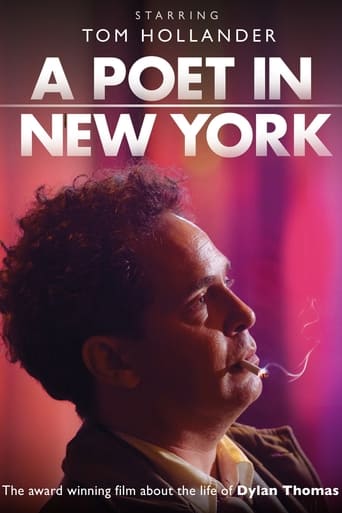anthonyjlangford
Talented without a doubt but what makes this film difficult to enjoy is that Thomas wasn't the best of human beings. Relationships weren't his strong point. He can't help himself of course so it's like watching a train wreck, waiting for the inevitable crash. That sometimes makes for uninspired viewing. Performances are good though as is the poetry itself, naturally. Having said that, I liked him more when I didn't know this much about him. As a writer who's struggled with depression and alcohol, it doesn't surprise me and I completely empathize, but it doesn't necessarily make for a good movie. No disrespect. Is this film the way he'd like to be remembered? Read his work instead. You'll get a lot more out of it.
Prismark10
Dylan lived a life of booze, sex and ill health. He died young and in that time wrote great poetry and did a lot of readings which Thomas is also known for.This film concentrates on his American tours in the last part of his life. New York seduces him with fame and booze but the stories I heard about his time in New York, some by people still alive who knew him in that period are more interesting than this biopic.There was some good use of period footage used in this film and Tom Hollander channelled the essence of Dylan Thomas but it was also a by the numbers biopic with love, drink, lust, betrayal and poetry.The film would have been better with some actual American actors playing Americans although Ewen Bremner was good the accent seemed to wobble here and there.The poetry recitals were good and the flashbacks to his earlier in Wales were intriguing but this was a wasted opportunity.
l_rawjalaurence
Dylan Thomas gets the full BBC costume drama treatment in Andrew Davies' screenplay and Aisling Walsh's production. Historical accuracy is paramount; the costumes are well-crafted, the settings appropriately kitschy, the cast impeccable, with Tom Hollander offering a remarkable vocal impersonation of Thomas' voice. There are the familiar stock plot-elements; the obligatory sex-scenes involving Thomas, his wife Caitlin (Essie Davis), a Polish countess (Wanda Opalinska) and a street- girl; the picture-postcard shots of the Welsh coastline, with sequences shot in Thomas' writing-den right by the sea; and the syrupy music (by Debbie Wiseman) forming a - somewhat intrusive - backdrop to Thomas' love-scenes with Caitlin and his platonic relationship with amanuensis/secretary Liz Reitell (Phoebe Fox). In truth the drama doesn't tell us very much about Thomas' character, other than to suggest his fundamentally self-centered nature, and his continual memories of a childhood where he was often taunted by other children on account of his bronchial troubles. The atmosphere of early Fifties New York is adequately re-created, although the mock-up of the Chelsea Hotel (where Thomas spent his last days) looks nothing like the actual building. Some of the American accents are a bit questionable - especially Ewen Bremner's performance as Thomas' friend and promoter J. M. Brinnin - but in general this is a solid if somewhat unspectacular production.
Robert Padam
The factual errors stood out like New York skyscrapers. And worse, far worse, was the continuation of this sentimental, ultimately soggy romantic vision of the tortured poet whose grip on existence solely revolves around his ability to pluck poems from the life-defying chaos. Dylan himself didn't even know when he was lying so it's up to those writing about him now to sort the truth from his fiction. He said he couldn't eat, sleep, f*** or drink but in this managed to do at least two of them rather well considering and if you substitute unconsciousness for sleep then three (breathe would have been a better addition). He still managed to complete Under Milk Wood, had Stravinsky waiting for a libretto, was roasting hostesses among others (I'm unfamiliar with the sources for the nameless blow-job girl), and was necking booze like it was coming into fashion. Eighteen straight(double)whiskies was merely his proved last lie and it's sad enough to perpetuate that. But all this was nothing to compare to the sight of his spirit lifting from his corporeal self on his hospital bed on his death (not while unromantically being given a bed bath which would have been the truth) and then this phantom phantom rising to smile as it watched its younger self gambolling through the child high hay around pretend Fern Hill. It was a scene that would have been perfect in a Powell and Pressburger film of the 1940's but is laughable now. Even the 'wild' Dr Feltenstein was more Dr Finlay - perhaps because the haze of litigation is the primary pollutant of the New York City air these days. Brinnin was portrayed as a devoted friend with a crush on the poet rather than a purveyor of the very myth this film perpetuates. There was no need for Dylan to die in New York and with better medical treatment and guardianship he wouldn't have done. It raises the question of why make a film in the centenary year of the poet's birth that concentrates so much on the poet's death. The answer must be because it is more dramatic and commercial. This was the same motivation for Brinnin's 'Dylan Thomas in America', which was full of inaccuracies, the reasons for many of those being rather dubious. It is this account on which the film seems largely based when something closer to the truth is far easier to come by these days. Beautifully acted and filmed but...




